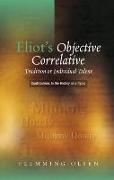- Start
- Eliot's Objective Correlative
Eliot's Objective Correlative
Angebote / Angebote:
Eliot's dictum about the objective correlative has often been quoted but rarely analysed. This book traces the maxim to some of its sources and places it in a contemporary context. Eliot agreed with Locke about the necessity of sensory input, but for a poet to be able to create poetry, the input has to be processed by the poet's intellect. Respect for control of feelings and order of presentation were central to Eliot's conception of literary criticism. The result the objective correlative is not one word, but "a scene" or "a chain of events". Eliot's thinking was also inspired by late 19th century French critics like Gautier and Gourmont, whose terminology he not infrequently borrowed. But he chose the term "objective" out of respect for the prestige that still surrounded the Positivist paradigm. In its break-away from Positivist dogmas, criticism of art in the early 20th century was very much preoccupied with form. In poetry, that meant focus on the use and function of the word. That focus is perceptible everywhere in Eliot's criticism. Even though the idea of the objective correlative was not an original one, Eliot's treatment of it is interesting because he sees a seeming truism ("the right word in the right place") in a new light. He never developed the theory, but the thought is traceable in several of his critical essays. On account of its categorical and rudimentary form, the theory is not unproblematic: whose fault is it if the reader's response does not square with the poet's intention? And indeed, Eliot's own practice belies his theory -- witness the multifarious legitimate interpretations of his poems.
Fremdlagertitel. Lieferzeit unbestimmt
